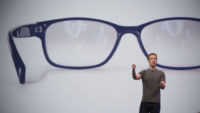New augmented reality glasses intended for consumers are on the horizon. Facebook plans to release a version in partnership with EssilorLuxottica’s Ray-Ban brand and is developing AR glasses that work with sensor-enabled wristbands. Meanwhile, Niantic and Qualcomm have teamed to manufacture AR glasses, and Apple is working on an AR headset for consumers, to be followed by AR glasses. Snap is also developing AR glasses aimed at consumers. Google, which debuted Google Glass in 2013, is also said to be planning another attempt at the consumer market.
The Wall Street Journal reports that, “tech companies see AR glasses as an opportunity to drive consumers to spend more time in their ecosystems, where they can show ads, sell products and pursue other moneymaking opportunities.” Facebook Reality Labs vice president Andrew Bosworth explained, “to have a chance to potentially pioneer a new era is very exciting.”

“This is a technology that doesn’t live in my pocket; it lives on my face,” he said. Niantic chief executive John Hanke said his company is planning on public testing of its AR glasses soon.
Currently, AR headsets and glasses from the likes of Microsoft with its HoloLens and Magic Leap are focused on professional and industrial users. Early AR glasses aimed at consumers also had problems with battery life “as well as a lack of functions beyond what could be done on a smartphone or other tech gadgets.”
At Upskill, which makes AR software for businesses, chief executive Brian Ballard believes the combination of extended battery life, minimized heat output and consumer expectations for fashion, comfort and price are “extremely hard to pull off.” Early AR consumer glasses might not be able to “easily accommodate people who rely on prescription eyewear … [and] stylish, all-day-wearable specs where digital content is projected through lenses are at least a year away.”
IDC research director of AR/VR Ramon Llamas noted that, “Joe and Jane consumer for the most part is comfortable with the tech they currently have.” For that reason and the fact that the new breed of AR glasses are expected to cost at least $1,000, experts expect adoption to “be slow at the start.”
IDC estimated that “fewer than 1 million units of AR glasses and headsets will be sold this year, but projects that will grow to 23.4 million units in 2025, with businesses accounting for roughly 85 percent of purchases.”
Going forward, manufacturers of AR glasses will also face issues of user privacy and security. Facebook’s Bosworth said the company is “soliciting feedback from tech experts, regulators and consumers on this front,” and noted that the AR glasses will “have always-on cameras, always-on microphones.”
“This really is a technology that demands a public conversation about what the capabilities are going to be, what’s acceptable and not,” he said.
Related:
Niantic CEO Shares Teaser Image of AR Glasses Device, TechCrunch, 3/29/21
Apple Teases AR Glasses Reveal at WWDC, PCMag, 3/30/21
Snapchat’s Spectacles Might Become True AR Glasses This Time, The Verge, 3/30/21

No Comments Yet
You can be the first to comment!
Sorry, comments for this entry are closed at this time.